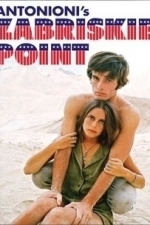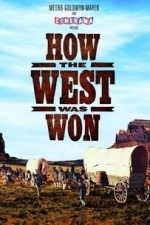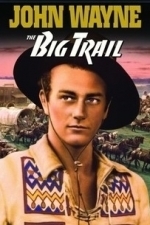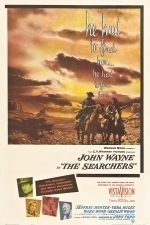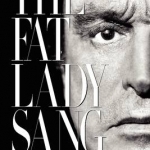
The Fat Lady Sang
Book
The Kid Stays in the Picture is considered to be one of the best Hollywood memoirs ever, and now...

The Foodie: Curiosities, Stories and Expert Tips from the Culinary World
Book
Join award-winning writer James Steen for a feast of facts, stories, recipes and tips about food and...
Bill Pullman recommended Zabriskie Point (1970) in Movies (curated)
Awix (3310 KP) rated How the West Was Won (1963) in Movies
Jun 24, 2021
At least partly sold on the sheer number of stars involved, but in the end there's hardly any John Wayne, not much more Jimmy Stewart, and probably a bit more George Peppard than you'd honestly care for. It's quite naive, sentimental stuff, in many ways, and the technical side-effects of it being shot in VistaVision are very obvious. There's some magnificent photography, the odd effective cameo, and very occasionally a moving moment - but too often this is stodgy and episodic rather than a stirring saga.
RəX Regent (349 KP) rated The Big Trail (1930) in Movies
Feb 19, 2019
And The Big Trail is where it really begins for Wayne, but this 1930’s classic was a box office failure, coming not only at the dawn of sound film, but at the time of The Great Depression. It would be another decade by the time “The Duke” wold be born and John Wayne would take his crown as the western superstar which we all know today.
But The Big Trail, originally entitled The Oregon Trail, is not really a John Wayne vehicle. He was a relative unknown actor alongside stage talent, many of whom were drafted into Hollywood at this time simply because they could give a decent vocal performance, as many a silent star was falling, failing to adapt the talkies.
But again, sound is not the selling point of this movie. This was one of a handful of films which pioneered the 70mm film format, in this case, Fox Grandeur, or Grandeur 70. A none anamorphic widescreen format, which whilst not the first attempt, nor the first 70mm film format, it was the nearest to which would succeed later.
2oth Century Fox would change cinema in 1953 with the release of the first CinemaScope film, The Robe, a year after the debut of Cinerama, but Grandeur more closest resembles Todd AO, a format which is still technically used today though in a somewhat different way. The secret to CinemaScope’s later success was in many ways the reason for the failure of Grandeur and that was the fact that CinemaScope was an anamorphic process, screening the image from a regular 35mm film and expanding with the lens, therefore making it a lot cheaper to adapt existing projectors and auditoriums.
Grandeur on the other hand was a larger film format and required a complete upgrade to theatres and therefore, especially at the dawn of the depression era, was financially untenable. Only two theatres in the U.S. would ever show this film in its widescreen glory, with rest showing the alternate 35mm Academy version.
And this film, had SIX versions shot simultaneously, in four different languages, 35mm and 70mm, each requiring different takes with different cameras or casts. This was an incredible feet but one which would soon be reduced with the use of audio dubbing, subtitles and ability to pan and scan.
The problem with this film is simple. It has a loose plot but no real twists and turns. This is almost a documentary following the wagon train trail across the west as group of pioneers make their way to the better life and building the United States, or at least personifying the romantic version of it.
But the film’s pacing and visual style works best through the widescreen lens, a beautiful journey with the untamed west as backdrop, but this is not the the version that most people have seen. The majority only saw the 35mm version which is 20 minutes shorter, edited more quickly and simply doesn’t have the visual flare of the Grandeur version. And without this vast visual canvas, the thousands of extras and props are almost cut from the film, a film with now feels a bit pointless and bit wayward.
Starring an unknown, though despite his hammy acting, Wayne manages to hold his own, the pacing is rushed and the fact that this is an epic journey which we are embarking on with them is somewhat lost.
The widescreen version’s main failing is the sound, which is inferior and poorly mixed in comparison to the 35mm cut, which is crisper and louder, but sound was never going to this movie’s strength and it was still rudimentary at this point. But on a visual level, considering the age of the print, the cinematography is up there as being some of the best, with scale and dare I say, “grandeur” about it.
This is an interesting film to watch now, though unless you are a strong western fan, I would say that it will not thrill, though as a peace of cinematic history, it is littered with footnotes and it very watchable.
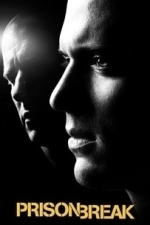
Prison Break - Season 1
TV Season Watch
An American serial drama television series. It commenced airing in 2005 on the Fox Broadcasting...

The Business of Life | Self Help | Spirituality | Wellness | Create Your Ideal Life
Podcast
Welcome to The Business of Life Podcast, created to help YOU live the life you love to live. A...
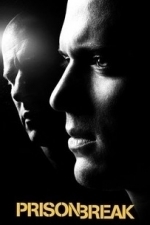
Prison Break - Season 2
TV Season
This season begins eight hours after the escape from prison; focusing mainly on the escapees. The...
Ray Winstone recommended The Searchers (1956) in Movies (curated)
Awix (3310 KP) rated The Searchers (1956) in Movies
Oct 8, 2020
On one level this is another colourful, slightly cheesy and rather sentimental 1950s western - but on another it has a darkness to it which is quite surprising, for all that this moral ambiguity arguably eventually consumed the genre. It's a film about racism and an obsessive desire for vengeance - the Native Americans in this film are given a degree of depth and generally treated respectfully, but the film is honest about the savage conflict between them and the colonial population, and Wayne's mania for revenge, though understated, is clear. The film's subtexts about the importance of family and what it means to be an American are well-presented, though no doubt problematic for many modern viewers. Still, this is a hugely important and influential western and probably a great movie too.
